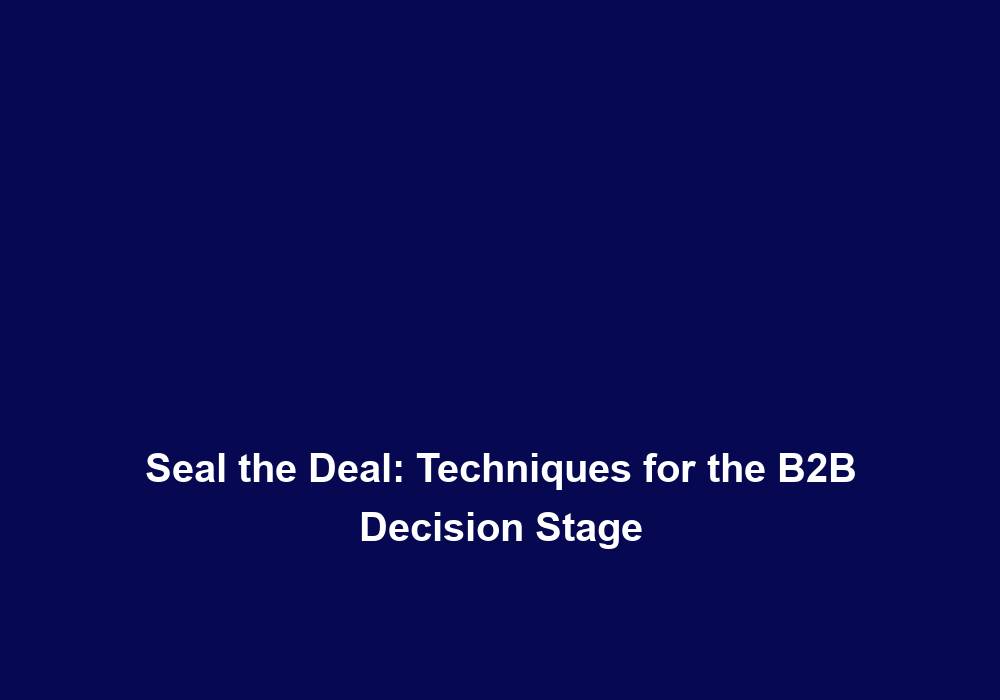In the fast-paced world of B2B (business-to-business) marketing, sealing the deal at the decision stage is crucial for the success of any company. This stage represents the final step in the buyer’s journey, where potential customers evaluate different options and make a final purchasing decision. To effectively navigate this stage and win over customers, B2B marketers must employ specific techniques that not only capture attention but also build trust and credibility. In this article, we will explore some proven strategies to help you seal the deal at the decision stage.
Understanding the Decision Stage
Before delving into the techniques, it’s essential to grasp the characteristics and challenges of the decision stage. At this point, buyers have identified their problem or need and are actively seeking a solution. They are evaluating various options, comparing prices, features, and benefits, and assessing potential ROI (return on investment). However, they may face concerns, such as risks associated with switching vendors, implementation challenges, or compatibility issues. Marketers must address these concerns head-on and provide compelling reasons for buyers to choose their product or service.
Addressing Concerns and Building Confidence
During the decision stage, buyers often have concerns regarding the risks associated with switching vendors or implementing a new solution. To overcome these concerns, it’s crucial to provide detailed case studies and testimonials. Showcase successful implementations of your product or service for similar clients, emphasizing how your solution resolved specific challenges. Use real-world examples to demonstrate the benefits and ROI your customers have experienced. This social proof acts as a powerful motivator, reassuring buyers that your offering has delivered tangible results for others.
Additionally, offering free trials or demos can significantly boost your chances of sealing the deal. Allowing potential customers to experience your product or service firsthand provides an opportunity for them to explore its features, functionality, and ease of use. This hands-on experience helps them envision how your offering can solve their specific challenges. By reducing the perceived risk associated with making a purchase decision, free trials or demos enable buyers to evaluate the suitability of your solution for their needs.
Crafting Targeted Content
Content marketing plays a vital role in capturing and nurturing leads throughout the buyer’s journey, especially during the decision stage. It’s essential to create targeted content that directly addresses buyers’ concerns and offers valuable insights. Consider creating blog posts, whitepapers, or e-books that delve into the benefits and features of your product or service. Craft content that highlights its competitive advantages, unique selling points, and how it compares to alternatives in the market. Providing this information helps buyers make informed decisions and positions your offering as the ideal choice.
Furthermore, personalized email campaigns can be highly effective in nurturing leads during the decision stage. Craft emails that speak directly to the buyer’s specific pain points and challenges. Tailor the content to address their individual concerns and emphasize how your solution can overcome them. Use targeted language, compelling visuals, and persuasive CTAs (call-to-actions) to encourage action. Offering exclusive discounts, extended trials, or limited-time offers can create a sense of urgency, driving buyers towards a purchasing decision.
Establishing Trust and Providing Support
Building trust is critical for winning over potential customers in the decision stage. Establish yourself as a thought leader in your industry by creating high-quality, informative content. Publish articles, videos, or podcasts that provide expert insights, industry trends, and valuable tips. Consistently deliver content that showcases your expertise and demonstrates your understanding of the challenges buyers face. By positioning yourself as a trusted authority, you increase your credibility and enhance the likelihood of sealing the deal.
To further enhance trust, implement live chat support on your website. This allows you to address any questions or concerns buyers may have in real-time. Use knowledgeable and friendly customer service representatives to provide instant assistance and guide potential customers through their decision-making process. Timely and personalized communication helps build trust and demonstrates your commitment to customer satisfaction.
Reducing Perceived Risk
During the decision stage, reducing perceived risk is crucial when buyers are making their final decision. One effective way to do this is by offering guarantees and warranties. These assurances can include money-back guarantees, extended warranties, or satisfaction guarantees. By providing these offers, you demonstrate your confidence in the quality and effectiveness of your product or service. This additional layer of protection can sway hesitant buyers towards choosing your solution over competitors.
Providing Exceptional After-Sales Support
Your relationship with customers shouldn’t end after they make a purchase. Providing exceptional after-sales support is crucial for customer satisfaction and loyalty. Offer comprehensive training programs, user guides, and technical support to assist customers with product implementation and usage. Promptly address any issues or concerns they may encounter, ensuring a smooth and successful experience. By going above and beyond, you reinforce trust and create a positive brand perception.
Conclusion
Sealing the deal at the decision stage requires a strategic and customer-centric approach. By understanding the unique challenges buyers face during this stage, you can employ effective techniques to build trust, instill confidence, and differentiate your offering from competitors. Leveraging detailed case studies, offering free trials, implementing content marketing strategies, and providing personalized support all contribute to a successful B2B decision stage. Remember, the goal is to showcase your expertise, address concerns, and demonstrate the value your product or service brings to potential customers.

The decision stage can indeed feel like the climax of a gripping story, where every character—the buyer, the seller, and even the product—uniquely plays a role in shaping the outcome. It’s fascinating how B2B marketing has evolved to meet the complexities of this stage, especially as we’ve entered an age where information is abundant, yet trust is coveted.
Your insights on the decision stage in B2B marketing resonate deeply with me, particularly the emphasis on building trust and credibility. In my experience, this stage is often where the rubber meets the road, and it’s fascinating to see how a fine-tuned approach can significantly impact a buyer’s decision-making process.